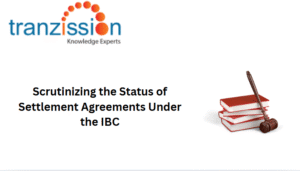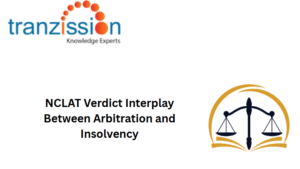
Understanding the Interplay between Insolvency Law and Contract Law

Table of Contents
When a party to a contract becomes insolvent, it significantly impacts their ability to fulfill their contractual obligations potentially leading to disputes over contract performance, termination rights, and the overall legal framework of the agreement. It creates a complex situation where the solvent party may face uncertainty regarding their contractual rights and potential losses due to the insolvent party’s inability to meet their commitments. This article delves into the reciprocity of insolvency law and contract law in India.
Key Themes in the Interplay of Insolvency and Contract Law
Principle of Contractual Sanctity vs. Insolvency Resolution:
The principle of contractual sanctity means that once a contract is formed both parties are legally bound to fulfill their obligations under it. Insolvency resolution under the Insolvency and Bankruptcy Code, 2016 (IBC) is a legal process that allows a financially distressed company to restructure its debts and potentially modify contracts to facilitate a recovery plan. Therefore, contract law prioritizes the sanctity of contracts, ensuring that parties honor their agreements, while Insolvency Law and Contract Law, introduces mechanisms to override certain contractual provisions for the greater good of economic restructuring.
Read more : Implications of Public Policy in the Insolvency Process
Resolution Plans Under the IBC:
A resolution plan is a proposal by a prospective buyer, the resolution applicant, to the Committee of Creditors (CoC), outlining how they intend to resolve a company’s insolvency by restructuring its debts and maximizing the value of its assets. The resolution plan often modifies or terminates existing contractual obligations to enable the debtor’s financial recovery. Its legal interpretation under the IBC ensures that resolution plans align with the overarching principles of fairness and transparency.
Stay Orders and the Suspension of Contractual Rights:
Insolvency proceedings can end in a stay order when a court issues an order to temporarily halt all actions related to the insolvency process. During this period, certain creditor rights are often suspended, such as their rights to enforce contracts, helping to protect the corporate debtor from aggressive recovery measures However, it also raises questions about contractual fairness.
Impact of Insolvency Law on Contractual Obligations
When a party to a contract becomes insolvent, Insolvency Law and Contract Law can significantly impact their contractual obligations:
Modification of Contracts in Resolution Plans:
The insolvent party either partially or fully terminates the contract, prioritizing certain creditors. In resolution plans, there may be termination or alteration of supply agreements, leases, or vendor contracts. Such modifications are crucial to restoring the financial health of the corporate debtor.
Read more : Implications of Public Policy in the Insolvency Process
Rejection of Onerous Contracts:
The primary goal of rejecting onerous contracts is to protect the insolvent company’s remaining assets by not forcing them to fulfill contracts that would result in significant financial losses, thereby maximising the potential return for creditors. There the IBC allows the rejection of contracts that impose undue financial burden on the debtor and rejection aligns with the principles of maximizing value for all stakeholders.
Limitations on Termination Clauses:
In India, Insolvency Law and Contract Law limits termination clauses in ways that protect the contracting party and ensure the business continues to operate. Section 14(2A) of the IBC prevents the termination of contracts for critical goods and services during the moratorium period. This protection is in place to help preserve the value of the corporate debtor and keep it operating.
The Role of Contract Law in Shaping Insolvency Proceedings
Contract law is important in insolvency proceedings because it governs how contracts are interpreted and enforced when a company is in financial trouble:
Defining Pre-Insolvency Rights:
Pre-insolvency proceedings are a way for companies to restructure their debts before they become insolvent. They are a form of debt resolution that falls between a contractual obligation and formal insolvency under the IBC. Contract law governs the pre-insolvency rights and obligations of the corporate debtor and its counterparties, while also defining the rights that often influence the prioritization of claims during insolvency.
Enforceability of Arbitration Clauses:
In India, arbitration in contracts involving insolvent parties is enforceable if the receiver adopts the contract. Disputes that arise from contracts during insolvency proceedings often invoke arbitration clauses. The IBC by way of section 14 ensures that such disputes are resolved without disrupting the insolvency process.
Assessing the Nature of Contracts in Resolution Plans:
While a resolution plan contains terms and conditions, it is not considered a fully-fledged contract until approved by the Adjudicating Authority, as the insolvency process dictates its binding nature, not just the principles of contract law. Further, contracts are assessed to determine whether they are essential for the debtor’s survival or can be terminated.
International Perspectives on Insolvency and Contract Law
Insights from the IMF Principles:
The International Monetary Fund (IMF) supports orderly and effective insolvency systems to strengthen a country’s economy and financial system. It emphasizes balancing creditor rights with economic recovery goals in insolvency frameworks. Under contract law, the principles of the IMF also involve contract law modification tools to achieve this balance.
United States:
The United States Bankruptcy Code government’s insolvency and contract law. Chapter 11 enables debtors to reject onerous contracts while continuing essential ones, similar to the concept in the IBC in India.
In the United Kingdom:
The UK Insolvency Law and Contract Law governs how companies that cannot pay their debts are handled, including contract-related issues. The goal is to rescue the company, minimize losses, and fairly distribute the costs. The Corporate Insolvency and Governance Act restricts termination clauses similar to India’s IBC.
Challenges in Harmonizing Insolvency Law and Contract Law
Harmonising insolvency and contract law can be challenging due to technicalities and jurisdictional issues.
Balancing Creditor and Debtor Interests:
The Insolvency Law and Contract Law aims to ensure fairness to creditors while enabling debtor recovery. On the contrary, contract law ensures strict compliance to the terms and conditions of a contract, which during insolvency are often stayed. Thus, balancing creditor and debtor interests often creates legal complexities.
Judicial Interpretations and Uncertainty:
Courts and Adjudicating Authorities have given differing judgments. These inconsistent judicial rulings on contract modifications in insolvency proceedings can undermine predictability.
International Contracts and Cross-Border Insolvency:
There are increasing issues with cross-border insolvency, and a robust mechanism is needed to resolve these conflicts. The UNCITRAL Model Law on Cross-Border Insolvency has been widely adopted to resolve conflicts efficiently. However, such cases often involve conflicting contract laws, complicating resolution efforts.
FAQs
1. How does the IBC impact ongoing contracts during insolvency?
The IBC impacts ongoing contracts by imposing a moratorium, effectively pausing most legal actions against the corporate debtor, including terminating contracts during the insolvency process.
2. What happens to arbitration clauses during insolvency?
As per section 14 of the IBC, the arbitration proceedings are stayed when insolvency proceedings commence and require court permission to start or continue arbitration.
3. Are termination clauses enforceable under the IBC?
The IBC can restrict the use of termination clauses, particularly during insolvency proceedings. Courts can intervene to prevent terminations that could significantly harm the company’s ability to operate as a going concern during the moratorium period.
Conclusion
Insolvency law and contract law interact in several ways, including how contracts are treated during insolvency proceedings. The IBC can override existing contracts, meaning contractual rights might be altered or suspended to facilitate a fair distribution of assets among creditors, prioritising the going concern principle over strict contractual obligations. The interplay between insolvency law and contract law is crucial for balancing contractual obligations with the goals of economic recovery. India can adopt practices from the US and the UK to further refine the interplay between the IBC and contract law, enhancing its efficiency and transparency.





